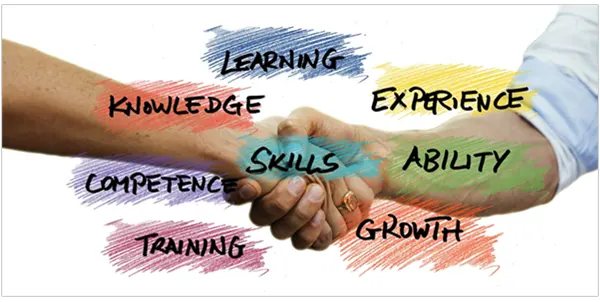
Continuously setting new professional goals and upgrading your skills is the ultimate way to achieve prosperity in your workplace and career. Thriving for new career goals is the best way to guarantee continuous professional development, which is why it’s always essential to keep adding new goals for work.
Through today’s article, we’ll dive deeper into what career goals are, how to set one for yourself, and, most importantly, tips to achieve your professional goals.
What are Professional Goals?
Professional goals are the targets that an individual sets to achieve in their career. These goals can be anything—learning a new skill, a salary hike, or entering a new industry like digital marketing.
Based on the time period the goals take to get accomplished, one can categorize them into:
- Short-Term Goals: These are the goals that can be achieved in a short period of time, say one day, one week, or two to three weeks. Short-term goals can be anything, like accomplishing your daily target before the deadline or taking fewer breaks while working.
- Long-Term Goals: These are the goals that can be achieved over a long time, like 6–12 months or a few years. Unlike short-term goals, accomplishing long-term goals requires strategic planning and a multidimensional approach.
Setting the right combination of short-term and long-term goals is the most effective way to achieve your professional goal. For instance, when it comes to improving your English, learning 10 vocabulary words can be the short-term goal, and being proficient and fluent can be your long-term goal.
27 Examples of Professional Goals
Here are 27 professional goal examples that you can set for yourself to ensure a booming career.

Getting a Higher Salary
One of the most common professional goal examples is a salary hike. It strengthens your financial condition and secures your future. To achieve this goal, you can upgrade your skills or learn new skills, participate more in work-related activities, and show how you add value to the overall operation of the organization. Another thing you can do is change your job and find a company which will pay you what you want.
Getting Leadership Opportunities
Scoring a leadership position in your company can help you uplift your career’s trajectory and make you a valuable asset to the team.
A good leader can improve team engagement and become an inspiration for new employees, ultimately creating a positive work environment. To accomplish this goal, you need to harness problem-solving skills, multitasking capacities, and management abilities.
Learning New Tools
It’s a long-term goal that needs persistence and perseverance. The main motive for learning new tools is to stay relevant and up-to-date with ever-evolving technology.
The new tools might include advanced features that can do the work more efficiently. Learning the operation of new tools will also help you stand out from the rest of the employees in your workplace.
Working in your Dream Company
Being a part of prestigious companies like Google, Facebook, and Tesla is a dream for many. Working in these companies requires the pinnacle of skill. Figure out the job profile you want to apply for, search for the required skill set, and keep an eye on the vacancies.
Having Work-Life Balance
It’s a short-term work goal that eventually brings long-term benefits. Developing a strong work-life balance is necessary for having a joyful life. It ensures that you are putting in your best efforts in your workplace while living your life to the fullest with your loved ones. Try to set boundaries by allotting working hours and make sure one doesn’t breach the other.
Starting Your Own Business
Establishing your own business is a long-term goal that requires strategic planning, leadership skills, management competencies, and extensive information about the chosen field. It can be the best decision at the peak of your career, but before opting for that, carefully analyze the risks involved, the market, and the target audience of your business.
To achieve this long-term goal, you can break it into many short-term goals. You can also set up an online business with ease and target a wide audience.
Improving Your Managing Skills
Becoming a manager can be a long-term goal for many. To fulfill this goal, one needs to develop exceptional management skills, such as leadership, organization, and time management.
To become a manager, make sure that you are good enough to resolve conflict, organize efficacious meetings, make bold decisions, and much more.
Becoming a Mentor
Having good experience and communication skills can help you become a mentor. Setting goals like active listening, being empathetic, and providing timely feedback to our mentees can help you excel in them.
Furthermore, you can also reach out to your seniors for suggestions on effective mentorship.
Getting an Internship Opportunity
Scoring an internship opportunity in a booming industry is the best way to start your career. Internships are great for learning new skills, increasing your network, and gaining experience. The professional goal of someone planning to score an internship should be to learn basic knowledge about the role and its functions, which might take a few months.
Growing your Network
Networking is a prominent factor in a professional’s life. It helps in business growth, getting a job, and exchanging ideas with professionals.
Start with attending networking events and taking your expertise to social platforms. This will not only foster your network but will also make it visible to your potential audience.
Moreover, you can also work on your social skills to connect with people. Start participating in business meetups, conferences, and office parties.
Changing Career
Sometimes, when you are not satisfied with the work in your current position, you consider switching to a different industry. To do so, you need to do thorough research on your preferred job and start working on the particular skill set required for it.
For example, if you want to become a paraprofessional, start making an action plan, brainstorm the career, and work on rebranding yourself.
Getting Excellence in a Skill
Improving your core skills is great for improving your work capacity. It can be either a soft skill or a hard skill. It will not only make you adaptable to the dynamic nature of the job but will also boost your chances of finding relevant work.
Getting Experience in an Industry
Industry experience is important for those whose work involves technical skills. It helps to identify the needs, trends, challenges, and opportunities of your target customers. Brushing up on your skills is the best way to make yourself irreplaceable and gain experience in an industry.
Learning a New Language
Excelling and learning a new language, whether a living or dead language, increases the chance to integrate into a new culture and fosters better connections with colleagues. Learning a new language becomes an absolute necessity if your job requires you to interact with people who do not speak the same language as you.
Furthermore, it promotes harmony and a sense of understanding in the work culture. It will not only help you get close to the other employees but also ensure effective communication within the company.
Getting an Award
Winning an award is a long-term goal that will increase your employability and credibility in the industry. It makes you feel motivated and encourages you to perform better next time. Not only that, awards also act as an assurance of excelling in a particular field.
Reducing Distraction
Making professional goals for work to reduce distraction can help you save a lot of time and provide extra time for pursuing other opportunities. You can limit your distractions by turning off the notifications on your smartphone, avoiding multitasking, and distancing yourself from people who distract you.
Work at your Dream Job
Many of you might have a dream of working in a specific position but don’t meet the requirements of the profile. To land your dream job, start with good professional goals and steps, like researching, upskilling, upgrading your CV, and networking.
Managing Time at Work Place
Getting better at your time management skills helps you focus on priorities, deadlines, and work-life balance. Start with making professional goals with steps like using time blocking and scheduling apps. You can also look at this productivity and time management course by Josh Paulsen.
Complete a Certification or Degree
Top professional goal examples include completing a certification or degree in your field. Getting a certification or degree will help you develop wholesome knowledge and skills. Make sure to follow a proper guide to online degrees to plan your degree or certification completion strategically.
It’s a long-term goal where you’ll need to push yourself daily and sneak out a bit of time from your busy schedule to learn something new.
Attending Professional Development Seminars and Conferences
Showing up to seminars and conferences exposes you to the new ideas of industry giants on professional growth and success. Not only that, but these are great for interpersonal and intrapersonal communication.
You can also find a mentor to provide guidance, advice, feedback, and support on your journey. To follow this work goal example, start attending programs and apply the learning to the projects.
Continuing Education
Some of you might be targeting to resume or continue your education, like pursuing a Ph.D. for professional development. Generally, it takes a long time, so consider breaking it into short-term goals. Stat devoting specific time to study and setting targets (topics) that you’ll cover during your study session.
Publishing Research Paper
Getting your research paper published is a dream come true for many professionals. It opens the door for career advancements, professional recognition, opportunities for collaboration, and increased visibility.
You should look at this book writing course by the University of Colorado about the details, language proficiency, and length of the research paper.
Learning From Seniors
In the workplace, learning from seniors is the best way to improve. You can improve in areas like managing family and money, strategy making, the workplace environment, and the fixation of the growth mindset. Set learning from seniors as your short-term goal for a month, and you’ll notice a drastic change in your management skills and productivity.
For this, start reaching out to them and asking for feedback and improvement areas. Besides, carefully observe them and see how they manage stress and bring the most unfavorable situation to their favor.
Create New Habit
Improving yourself and creating new habits will help you become a better version of yourself. It can be anything like exercising, collaborative strategic reading, or eliminating a bad habit from life.
To build a new habit, start with managing your time, challenging yourself, limiting distractions, and reflecting on your habits.
Collaboration Skills
Team collaboration should be a mandatory professional goal for all employees. It not only helps in achieving the objective but also assists in adding a fun element to the work, increasing knowledge, and improving relationships with each other. Start working on your communication and observation skills, and become used to getting feedback to be better at collaboration.
Becoming Organized
Being organized not only boosts your productivity but also promotes creativity, decision-making power, work-life balance, and mental health. But in the contemporary era of multitasking, staying organized and focused has become quite complex.
So to accomplish this goal, start by making a list of focus goals, managing your time, and using technology for ease.
Being a Better Listener
Active listening allows you to fully absorb what is shared and acts as a respectful gesture toward the speaker. Furthermore, it helps avoid misunderstandings and mistakes in the workplace.
Take slow steps and start by listening to the best audiobooks online. Be consistent, and over time you’ll notice your comprehension of verbal words has improved significantly.
How to Set Your Professional Goals?
Having a proper plan and structure for achieving your professional goals is necessary. That’s why I have curated a list of tips that will help you set the ideal professional goals for yourself. Follow these steps to set your professional goals.

Analyze Your Skills
The question that defines this stage is “What can benefit me more?”. Start by analyzing your current skill set and researching the skills that are in demand.
Examples:
1. Implementing artificial intelligence in education can be a professional goal for a teacher.
2. Learning about new data science technologies can be a professional goal for data scientists.
Write Down Your Goals
Now that you have researched and decided on your professional goal, it’s time to write it down on a piece of paper and place it somewhere visible. This simple practice is highly effective and will push your limits every time you think of quitting. The best place to stick it is in front of your study desk.
Strategic Planning
The next step is analyzing the goals and making strategies. You can also use the SMART planning strategy for effective and efficient goal setting. According to this approach, goals that are specific, measurable, achievable, relevant, and time-bound are more likely to keep an individual motivated during their learning phase.
Moreover, it can be followed by a SWOT analysis to identify the strengths, weaknesses, objectives, and threats to the goal’s success.
Short-Term and Long-Term
Break down your long-term goals into small-term ones for better time management. This will help you stay motivated and celebrate your small achievements.
For instance, break a long-term goal like a career in digital marketing into small goals like learning SEO, SMM, content marketing, and paid ads. Doing this will make the long-term goal achievable and less daunting.
Discuss Your Goals & Learning With Others
What is better than having a competition in your learning journey? Sharing your goals and learning can help you stay motivated and committed. Group up with like-minded people and compete with them to stay motivated. You can also ask for some tips and advice from the seniors in your field for a better output.
Set Deadlines
Setting deadlines is a crucial step in achieving your goals. Creating deadlines can help avoid procrastination, distraction, and gloating that can derail your objectives. Deadlines create a sense of challenge and urgency to work on goals and help in functional behavior assessment.
Celebrate Your Achievements
The last step is to celebrate your small achievements with rewards. Doing so helps with staying committed and motivated for long-term goals. You can go shopping, treat yourself to your favorite food, and play your favorite video game for a few hours.
Wrapping Up
Although achieving your professional goals can be tedious, setting such goals is crucial for upskilling and thriving in your career.
As a writer, I also aim for professional goals, which ultimately help me boost productivity, learn new skills, and bring the best out of me. No matter what profession you belong to, remember that setting workplace goals is important for constantly improving and updating as per trends.
FAQs
Ans:
Work evaluation goals are the targets you set for yourself to improve your skills and performance. These are examples of work evaluation goals.
- Productivity
- Efficiency
- Problem-Solving
- Education
- Motivation
Ans:
The following are the challenges you might face while pursuing your professional goals.
Lack of qualifications
Lack of clarity
Procrastination
Economic uncertainty
Lack of experience
Work-life balance
Time management
Ans:
Professional skills are significant because they help in adapting to changes, and employee’s ability to face challenges. You need these skills to operate daily tasks and properly perform your job.
Ans:
Being professional in the workplace requires a set of characteristics in an individual.
- Accountability
- Time management
- Respect Etiquette
- Punctuality
- Integrity
- Dress code
- Focused
Ans: Always do SMART (Specific, Measurable, Achievable, Relevant, Time-bound) goal analysis before setting targets and career goals. This will help you save your precious time and money.
Sources –